Post-Traumatic Growth – PTG
By David K. Devaney SgtMaj USMC Retired
Throughout modern warfare there has been a stigma attached to weeping; especially for warriors. Tears equal weakness to some people; usually out of pure ignorance. Many warriors will tell you that they know their fellow warriors better than their own siblings; which is usually true. For instance, infantrymen live and work in close quarters under adverse and extremely austere conditions and these warriors who live through misery together become closer by virtue of their shared experiences. They are our brothers and sister too; therefore, they deserve our tears.
Burying the memory – trying not to think about it.
Ave Atque Vale-Hail and Farewell. (Gaius Valerius Catullus 85 BC-54 BC)
Some warriors falsely believe they can just bury a memory; not going to happen my friends. You cannot “NOT” think about something. What are you wearing right now on your waist? Say a belt. Before I mentioned it, you almost surely did not even think about your belt. Now, try not to think about it will become difficult. In fact, this silly belt reference may remain with you for a very long time. I say, “think about it.” For many warriors this may assist them in healing.
Warrior at a gravesite.
So, what do you do if you are one of those who will visit a cemetery or a memorial somewhere, and you see a weeping veteran at a gravesite. I say, nothing. Weeping for our friends is a form of therapy. If fact, it would be best if that vet just weep until the weeping is done; cried out as you might say for a child. Now, if the vet is walking away and seems fine, I would ask him or her whom they were remembering. If they will engage you, get them to tell a story or two about theirs friend or loved one. It is therapeutic for each party. The same goes for vets wear KIA bracelets; ask about their fallen friend.
Our friends are not forgotten until we forget them. How dare we forget?
Finally, we are NOT allowed to weep about battle. Does a firefighter weep about fire? Does a pilot weep about flight? No, we may weep for the fallen BUT then why must then move on.
Our mission, is to honor out fallen friends.
Be the best human being possible. They gave their lives so we could enjoy ours. DO NOT waste it. Be the best husband, wife, father, mother, son, friend, worker, etc you can be. That is honoring our friends.
Thoughts…………
SF DKD
[jetpack_subscription_form]
Brought to you by the dudes at Spotter Up!
Through many countries and over many seas
I have come, Brother, to these melancholy rites,
to show this final honour to the dead,
and speak (to what purpose?) to your silent ashes,
since now fate takes you, even you, from me.
Oh, Brother, ripped away from me so cruelly,
now at least take these last offerings, blessed
by the tradition of our parents, gifts to the dead.
Accept, by custom, what a brother’s tears drown,
and, for eternity, Brother, ‘Hail and Farewell’.
Catullus 101 is an elegiac poem written by the Roman poet Gaius Valerius Catullus. It is addressed to Catullus’s dead brother or, strictly speaking, to the “mute ashes” which are the only remaining evidence of his brother’s body.
The tone is grief-stricken and tender, with Catullus trying to give the best gift he had to bestow (a poem) on his brother, who was taken prematurely. The last words, “Hail and Farewell” (in Latin, ave atque vale), are among Catullus’ most famous; an alternative modern translation might be “I salute you…and goodbye”.


